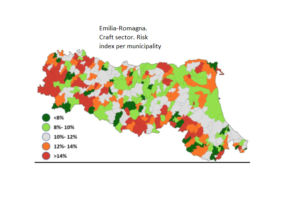CEGEP hosts European and Canadian delegations and showcases their innovative model on vocational education and business innovation
Cégep de Victoriaville welcomed an international delegation of approximately twenty dignitaries, policy makers, business leaders, and education specialists from Finland, France, Italy, and Canada on May 11 and 12. This significant visit, a direct outcome of the international Centres of Vocational Excellence MOSAIC project’s established relationships, focused on understanding Québec’s successful model of College Centres for the Transfer of Technologies (CCTTs), to understand better how this could be applied in Europe.
The delegation was hosted by the Inovem team—a leading innovation center in furniture and cabinetmaking—the École nationale du meuble et de l’ébénisterie (ENME), and Cégep de Victoriaville, all active drivers within the MOSAIC initiative.
The first day provided an in-depth look at Inovem’s structure, specialised expertise, and state-of-the-art facilities, including their eco-design station, product development labs, and other resources. Participants also toured the facilities of the École nationale du meuble et de l’ébénisterie. Later, a visit to «Victoriaville & Co», a prominent wooden casket manufacturer, showcased the dynamic collaboration between CCTTs and industry. Interactive workshops then facilitated discussions on strengthening collaborative innovation projects between European and Canadian SMEs. The importance of this exchange was further underscored by the participation of representatives from the Finnish and Canadian embassies, as well as senior officials from Québec’s Ministry of Higher Education (MES) and the Ministry of Economy, Innovation and Energy (MEIE).
On the second day, the delegation expanded their understanding by visiting two additional key CCTTs: the Centre for Expertise and Transfer in Organic and Local Agriculture (CETAB+) at Cégep de Victoriaville, and the Centre de métallurgie du Québec (CMQ), associated with Cégep de Trois-Rivières.

Mr. Denis Deschamps, Director of Cégep de Victoriaville, proudly highlighted the significance of the visit: “The Canadian CCTT model is generating increasing international interest. This visit confirms the relevance of our approach, which relies on the synergy between vocational education and business innovation. We are proud to contribute to this international dialogue and to inspire other countries to embrace structured collaboration between applied research and skills development.”
The MOSAIC project’s collaborative framework directly enabled this insightful second study visit to Canada. Initiated by Finnish partner «Wooden OY» and supported by French partner «SEPR», the visit’s ultimate goal is to explore the establishment of similar models in their respective nations. The MOSAIC project has clearly forged extraordinary international connections, and its impact is expected to yield substantial and lasting benefits beyond its planned conclusion in 2026.




